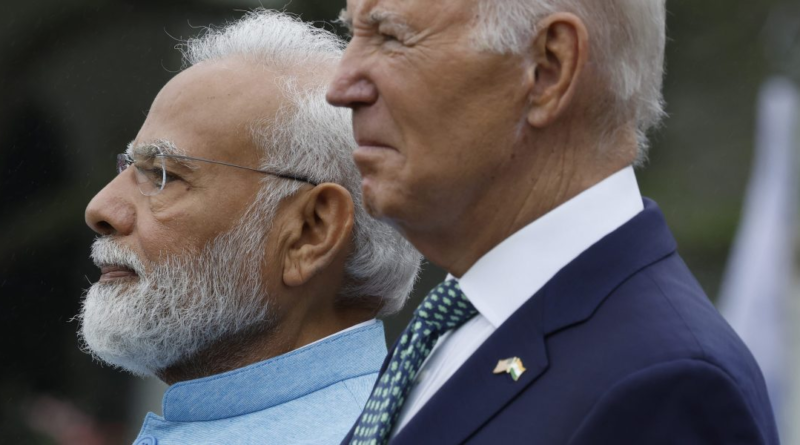Once banned from entering the U.S., Indian Prime Minister Narendra Modi is now signing deals in defense and chips with President Joe Biden
Narendra Modi made history in the 2000s for being the only person to be banned from the U.S. under a law protecting religious freedom. He was the chief minister of the state of Gujarat during deadly anti-Muslim riots, and because he failed to avert them, he was blocked from entering the U.S. for nearly a decade.
But how the tables have turned since. Modi is visiting the U.S. this week—his first state visit since becoming prime minister in 2014—and he was given a warm red carpet welcome by President Joe Biden. The meeting is meant to firm up ties between India and the U.S. on defense and technology.
The partnership between the two countries is “stronger, closer and more dynamic than at any time in history,” Biden told reporters during a press conference Thursday, Reuters reported. He emphasized that the relationship with India was among the most important for the U.S., and that the countries were working together on space, healthcare, and the economy.
Deeply touched by the warm and gracious welcome at the White House. Looking forward to fostering even deeper ties and mutual cooperation in the times to come. pic.twitter.com/W2e78ayylM
— Narendra Modi (@narendramodi) June 22, 2023
Modi has been good for the Indian economy, but remains a controversial figure inside India and outside. Despite limited press and religious freedoms under Modi’s leadership, India’s rise to power and role as a critical business partner is hard to overlook even for the Biden administration. The partnership is especially crucial as the U.S. looks to diversify from China amid heightened geopolitical tensions. Earlier this week, a group of 70-plus lawmakers urged Biden to question Modi about some of his crackdowns, and six Democratic lawmakers boycotted the prime minister’s address in Congress on Thursday over human rights concerns. But as far as bilateral cooperation goes, that didn’t do much to stop India and the U.S. from strengthening their ties.
“On the issues that matter most that will define the future, our nations look to one another including on critical regional and global issues,” Biden said.
During the landmark visit, the countries signed deals for the U.S.-based General Electric to work with India-based Hindustan Aeronautics to produce jet engines in India as well as the sale of armed MQ-9B SeaGuardian drones that are manufactured in the U.S. Biden is also boosting ties with India on the chip-making front, with agreements from the likes of Micron and Applied Materials.
India will also join the U.S.’s Artemis Accords on space exploration and work with NASA on a joint mission to the International Space Station in 2024.
The U.S.-India situation
On Thursday, guests at a White House state dinner—an honor reserved for the closest of U.S.’s friends—were to discuss topics like human rights over a meal of millet, mushrooms and strawberry shortcake . Still, the U.S. and India are not formally allies and India has kept its independent stance. That’s one reason why India hasn’t taken a strong stance against Russia’s invasion of Ukraine and has continued to trade with Russia.
At the same time, India’s stance towards Russia, its biggest defense supplier, has shifted as India strengthens partnerships with other countries including the U.S. and Israel, the Associated Press reported.
Modi has come a long way from being unable to set foot into the U.S. to becoming one of the most popular political figures in India. And in the U.S., he was received with great fanfare, including 7,000 people outside the White House cheering his arrival. He has also led India’s economy to a period of high growth and favorable business environment with a focus on Indian manufacturing, and has helped draw foreign direct investment.
The U.S.-India ties also serve as a counterweight to China. In recent years, the U.S. has tried to diversify its manufacturing from China amid increased geopolitical tensions, and has added more trade restrictions and barriers against U.S. companies doing business there. That bodes well for India, which has had a tense relationship with China since the 1950s, and stands to gain manufacturing jobs as a result.
“New Delhi has a pivotal role to play in checkmating China — if politically nudged, militarily helped and geopolitically encouraged by the U.S. and its allies,” Happymon Jacob, a professor at New Delhi’s Jawaharlal Nehru University, told the New York Times.
And now, India is positioning itself as the go-to business hub. On Tuesday, Tesla CEO Elon Musk said that his company plans to make “significant investments in India” and wanted to do so “as soon as humanly possible” after he met with Modi in New York. In April, Apple debuted its first two retail stores in the country after rapidly expanding production of its devices there in recent years, sending a soft signal about India’s growing importance to the nearly $3 trillion company.
In some ways, the cooperation between the U.S. and India may reach unprecedented levels, given the high stakes for both countries.
“The challenges and opportunities facing the world in this century require that India and the United States work and lead together, and we are,” Biden said when welcoming Modi.


